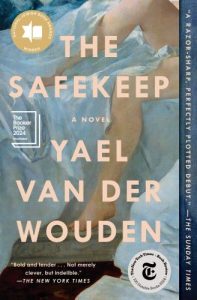
Review by Kevin Brown
The term “safekeep” has echoes of keeping something safe for somebody else, as if a person is holding onto something precious for that somebody. In Yael van der Wouden’s debut, Orange-Prize-winning novel, The Safekeep, it first appears that Isabel is keeping herself safe from the world, though it’s not exactly clear as to why. She has isolated herself in the house where their Dutch family moved during World War II. Their father had died, so their uncle helped them find this house outside Zwolle, to try to keep them safe. Isabel still lives there, more than a decade later, after her mother has died, and her two brothers live in the city.
She has isolated herself from her brothers, as well, as she doesn’t approve of either of their lifestyles. Louis dates one woman after another, yet he is unwilling or unable to commit to any of them for very long. If he does get married, though, the house becomes his, as their Uncle Karel believes he should have it to raise a family. Hendrik is in a long-time relationship with Sebastian, a relationship that 1960s Dutch society doesn’t approve of, though it seems Isabel is also upset at Hendrik for leaving her and the house.
Louis begins dating Eva, whom Isabel clearly dislikes, but his work requires him to go out of town for several weeks, and Eva suggests that she could live with Isabel during this time. Their few weeks together change Isabel’s life, as Eva’s presence first presents her with a realization of who she has always been but could never admit to herself, then leads to an epiphany about the Netherlands and the world, which Isabel has long suppressed.
In this outstanding first novel, Yael van der Wouden raises questions about the ways in which people deny truths about themselves, but also about how people tamp down unpleasant truths about countries and the world. She also provides hope that, if one person can admit to realities they’ve suppressed, perhaps more of us can, as well.
The Safekeep by Yael van der Wouden. Avid Reader Press, May 2025.
Reviewer bio: Kevin Brown has published three books of poetry: Liturgical Calendar: Poems (Wipf and Stock); A Lexicon of Lost Words (winner of the Violet Reed Haas Prize for Poetry, Snake Nation Press); and Exit Lines (Plain View Press). He also has a memoir, Another Way: Finding Faith, Then Finding It Again, and a book of scholarship, They Love to Tell the Stories: Five Contemporary Novelists Take on the Gospels.



